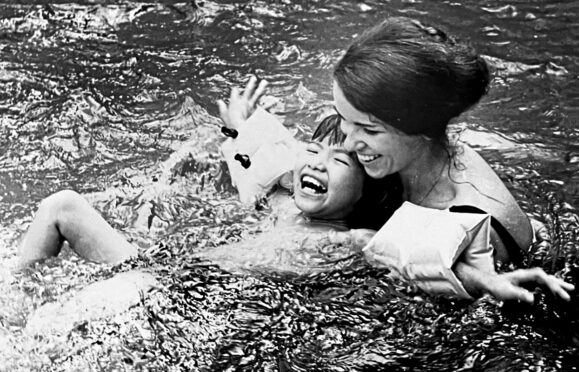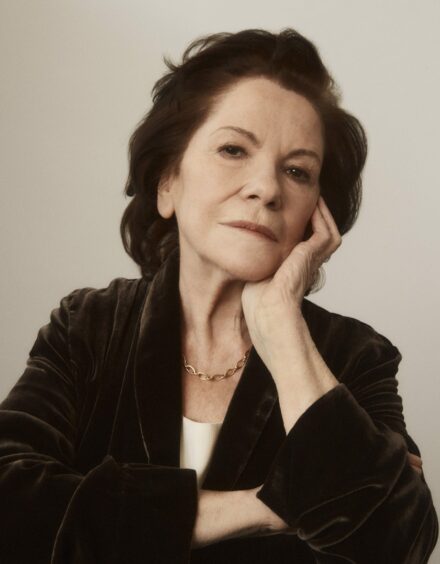
She is a reluctant aristocrat who snubbed the glitter of high society to care for young victims in war-ravaged Vietnam.
Now, after 35 years with the charity Save The Children – working in some of the most dangerous places on earth – Lady Cecil Cameron has finally found time for her other passion, writing, and has become at 73 an unlikely debut author, with her historical romance already winning critical acclaim.
She admits she could not have written her novel, An Italian Scandal, when she was younger and juggling the needs of her young children and working in conflict zones around the world from Northern Ireland to the Gaza Strip and the West Bank.
But Cameron, wife of Donald Cameron of Lochiel, Chieftain of Clan Cameron and “disenchanted debutante” who does not like to use her title, is hesitant to talk about her career in case she seems like a do-gooder.
She said: “I don’t want to be called Lady Cecil. I didn’t earn it, my father inherited it. It’s not modern, what’s the point of it? And you don’t want to create a barrier with other people. I have never thought of myself as a ‘toff’ but I have had a very privileged life. Maybe that is why subconsciously I wanted to go to Vietnam, to balance it up a bit. But I am terrified of sounding like a do-gooder. It is something you want to do, and not because you are a do-gooder.”
The author – whose Italian heritage on her mother’s side and her passion for the country’s history inspires her work – had graduated with a degree in history and was working in research in 1972 when her life changed forever.
Reliving that moment, she said: “It was getting near to the end of the war in Vietnam when the Americans were pulling out. The situation was terrible, rather like Afghanistan, and hundreds of unaccompanied children were left behind. They were crammed into pens in orphanages in Saigon. The people looking after them were trying their best, but they were overwhelmed. I saw the pictures on television and thought, ‘I must go’.
“When I first arrived I found the conditions very difficult. There were rats running underneath the beds, but it was the children and the people working with them who were inspirational.”
She worked with various organisations, including Save The Children, who she considered “outstanding”. “The children were remarkable,” she said. “Despite their appalling conditions they had a sense of joy.”
Although not a qualified nurse, she went where she was needed, helping in clinics for children with burns, malnutrition and polio, and visiting leper colonies. Cameron recalled helping a six-year-old polio sufferer who needed hydrotherapy: “I have a photo of that small girl in the pool with me laughing. It sums it up. Her laughter was so touching, and she had nothing to laugh about. Then I worked in a rather wonderful clinic where they were doing surgery on children who had suffered burns.
“We saw some awful things but the children were wonderful. Their joy and their resilience was an inspiration. It wasn’t me doing good but me learning and being incredibly rewarded.”
And Cameron recalls twins she cared for at one clinic. She remembers: “I was holding the twins. They were so malnourished there was risk of brain damage.”
After a year, she returned home and married Donald in 1974. Their first daughter was born just before the fall of Saigon in April of 1975. Cameron tried to get some of the most vulnerable little ones out of the country but said the Home Office refused the necessary visas.
Cameron, the mother of Highlands and Islands MSP Donald, then joined the London office of Save The Children and, after her second baby was born, sat on its Overseas Committee. “I visited various war zones, setting up projects in Gaza and the West Bank and went to other places like Romania and Northern Ireland which at that time was like a war zone,” she said.
“I spent a week in Gaza locked in. The worse shock was the overcrowding. It felt like a prison camp bursting with hundreds of children who, despite their situation, were extraordinarily resilient. Children are not political. It was the same in Northern Ireland; it was not a matter of whether they were Catholic or Protestant, they were just children. Save The Children is a non-political organisation and that is a great guideline.”
She remembers how, after Gaza, her youngest daughter had written that she was glad mummy didn’t get shot. “We were very careful always, as you were in Vietnam,” Cameron said. “We always checked with the Army if we were driving ambulances up the country or going to a leper colony. You had to. In Northern Ireland as well. There was always a bit of danger, but I was never really afraid because you are so focused on the children and the people working with them.
“Nothing could have been more dangerous than Vietnam. I am quite fatalistic in that way. You have to be or you wouldn’t cross a road. Be as careful as you can but don’t be so frightened that you don’t do it.”
When, as a mother-of-four, travel was more challenging, she became a trustee of the charity and later deputy chairman, and was awarded an OBE for her contribution. She left Save The Children in 2010.
Cameron, who divides her time between the clan seat at Achnacarry in the Highlands and London, told The Post: “Before I went to Vietnam I thought I would become a historian, but when came back I only wanted to work for Save The Children. I worked for them 35 years. It was a wonderful job and I was lucky to have it.”
Now she has a new job. The novelist’s debut draws on her family’s connections with Sicily and southern Italy. Her grandmother came from Naples and she has always wanted to write a love story, set against the turbulent backdrop of Garibaldi’s Italy. A tale of love and passion, hatred and revenge and the revolution that created a nation. And it has for its heroine Carina Temple, who casts aside society’s expectations of what a single young lady should be and do and who is told her reputation is ruined, thanks to a certain lord.
It is informed – in small part – by the author’s past. “I did the deb (debutante) thing at 18 but I didn’t enjoy it,” Cameron revealed. “It wasn’t quite my sort of thing, which is why it was so easy to write Carina becoming disenchanted with London Society, I slightly felt that. I wanted to do something more, so I ran off to university.”
The novel is already receiving rave reviews, with actor Rupert Everett branding it his “historical novel of the year” and literary critic Miranda Seymour describing it as “suspense-filled and gorgeously romantic”.
Cameron – one of six children born to Peter Kerr, the 12th Marquess of Lothian, an accomplished jazz pianist, and his journalist wife Antonella Kerr aka Tony Lothian – couldn’t be more pleased.
The writer who first began crafting stories as child growing up in idyllic Monteviot House and the estate in Jedburgh, believes her late parents would be delighted too.
“My mother was a quite a feminist and founded the Women Of The Year lunch. She was a hard worker who loved achievement. They were not grand and were quite off-beat. I think both would be proud.
“Some people say 73 is very old for a debut author but I don’t feel old and I am just thrilled.”
An Italian Scandal is out now in hardback, ebook and audio, published by HarperNorth.

Enjoy the convenience of having The Sunday Post delivered as a digital ePaper straight to your smartphone, tablet or computer.
Subscribe for only £5.49 a month and enjoy all the benefits of the printed paper as a digital replica.
Subscribe